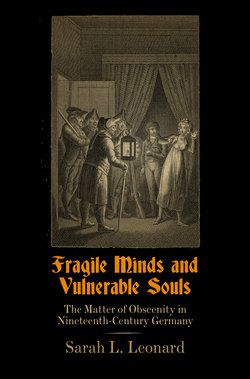Fragile Minds and Vulnerable Souls

Реклама. ООО «ЛитРес», ИНН: 7719571260.
Оглавление
Sarah L. Leonard. Fragile Minds and Vulnerable Souls
Отрывок из книги
Fragile Minds and Vulnerable Souls
SERIES EDITORS
.....
Tom Cheesman has studied the “true crime narratives” that were ubiquitous in eighteenth- and early nineteenth-century German street literature. These narratives were often performed orally with the aid of poster boards (anyone who has seen the prelude to Threepenny Opera will be familiar with Moritätslieder); during the first half of the nineteenth century it was not uncommon for these oral stories to be published in inexpensive editions. It is likely that the Eva Riedelin pamphlet was such a story, and the narrative is typical of the genre. Cheesman explains, “The shocking ballad tradition is one of dramatic elaborations of this basic legend, the central motif being refusal of a request for food—i.e. ‘hard-heartedness.’” The basic outlines of this story sound familiar: a poor family, often headed by a women, is threatened with starvation. A request is made for charity from someone who is better off, and this request is refused. In the published versions of the story the woman usually kills all the children and herself. Cheesman interprets the “hard-heartedness story” as a reflection of emerging bourgeois norms, particularly ideas of the “self-enclosed” and “self-sustaining family,” newly separated into a public sphere in which the man worked, and a private sphere dedicated to privacy and consumption.45 The story of Eva Riedelin seems to complicate this analysis a bit: the baker’s wife works alongside her husband, and the baker has never before denied Eva bread (so women are not radically isolated). Nonetheless the story does highlight the economic vulnerability of the family, which is in fact so isolated that it must rely on the generosity of strangers to subsist.
A True Terrifying Horrifying Story lends itself to further analysis, just as it did in 1817, when the censors and police wrestled over the proper reading of the story. On one level the story offers a lesson in the perils of religious unbelief, stressing in the first few lines the fact that Eva, who will become the perpetrator of the unspeakable crime, has lost faith. This is also a story of serious economic hardship, as the family continues to starve despite the husband’s hard work. On another level an adequate account of the story must keep in mind that the themes offered in the story are themselves part of an existing body of narrative tropes, as Cheesman points out. Thus the history of such a text is related to real economic vulnerability of the kind certainly experienced by many tenant farmers, but the story has another history rooted in conventions and tropes dating to the eighteenth century, and probably earlier.
.....